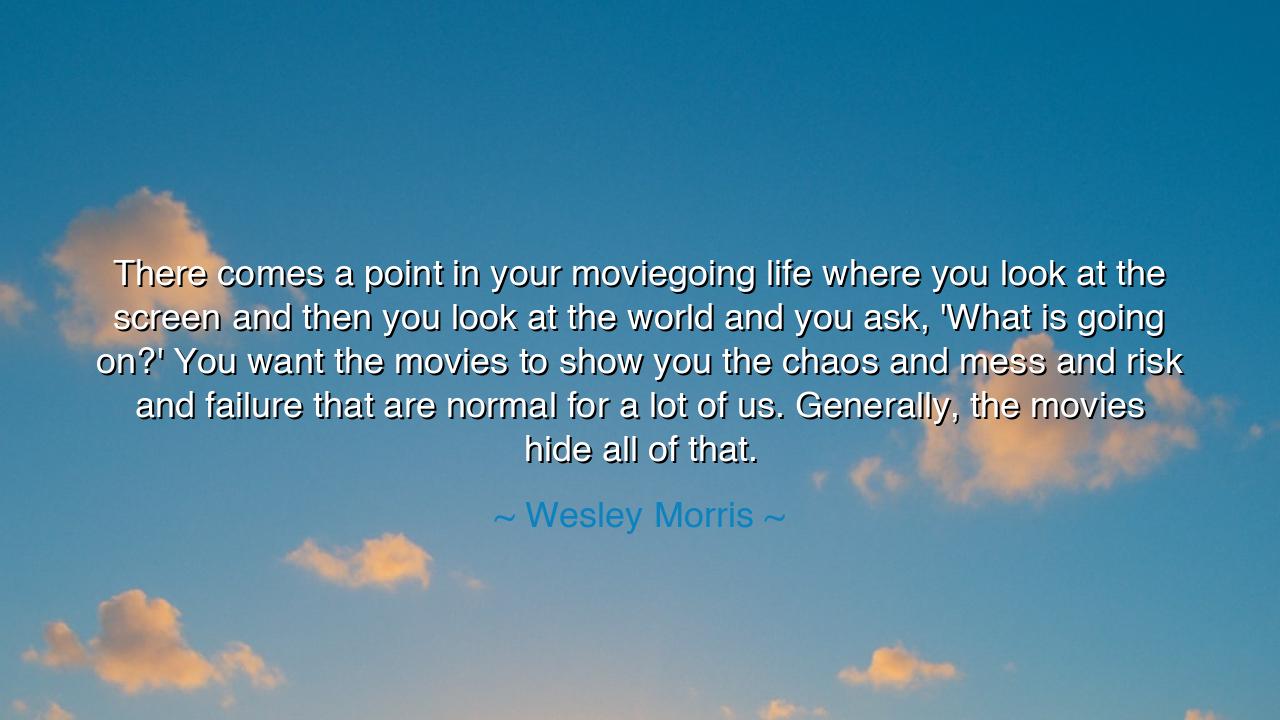
There comes a point in your moviegoing life where you look at the
There comes a point in your moviegoing life where you look at the screen and then you look at the world and you ask, 'What is going on?' You want the movies to show you the chaos and mess and risk and failure that are normal for a lot of us. Generally, the movies hide all of that.






Host: The room feels quiet, almost reflective, as the soft evening light filters through the window, casting long shadows across the space. Outside, the world continues its usual pace, but inside, the conversation feels like it’s about to touch on deeper themes of storytelling and reality. Jeeny sits at the table, her fingers lightly tracing the rim of her cup, her expression thoughtful. Jack stands near the window, arms crossed, gazing out at the street below.
Jeeny: (her voice gentle, yet filled with curiosity) “You ever think about how movies shape our perception of the world? How they often present a version of life that’s neat, tidy, and easy to follow, when the reality is much more chaotic and uncertain?”
Jack: (glancing over at her, his voice dry, but intrigued) “Movies shaping our perceptions? Yeah, they often show us a version of life that’s idealized—where everything comes together in the end, where problems are solved, and people get their happy endings. What’s on your mind?”
Jeeny: (nodding slowly, a small smile forming as she shares her thought) “I was thinking about something Wesley Morris said: ‘There comes a point in your moviegoing life where you look at the screen and then you look at the world and you ask, ‘What is going on?’ You want the movies to show you the chaos and mess and risk and failure that are normal for a lot of us. Generally, the movies hide all of that.’ It made me reflect on how movies often focus on the end result, the resolution, while ignoring the messy, chaotic parts of life that most people actually experience.”
Jack: (pauses, considering her words carefully) “So, he’s saying that movies often hide the parts of life that are uncomfortable or uncertain? They give us the tidy version of reality, the one that’s easy to consume, but they don’t really reflect the chaos and mess that are a part of being human?”
Jeeny: (smiling more deeply now, her eyes steady as she explains further) “Exactly. Morris is pointing out that while movies often show us the surface—the triumphs, the victories, the resolutions—they don’t dive into the real, messy parts of life. The chaos, the failures, and the risks that are normal for many of us are often left out of the picture. The movies give us an edited version of reality, one that makes us feel comfortable, but not necessarily seen or understood.”
Host: Jeeny’s words seem to linger in the room, creating a quiet space for reflection on how storytelling, especially in film, shapes our understanding of life. Jack stands still, his expression softening as he processes the deeper implications of Morris’ statement. The world outside continues its rhythm, but inside, the conversation feels rooted in a deeper understanding of truth in storytelling and life.
Jack: (his voice quieter now, almost reflective) “I see what he means. Movies give us an idealized version of life, one that often glosses over the messiness and unpredictability of reality. The chaos, the struggle—that’s what most of us experience, but movies rarely show it. Instead, they offer us something easier to digest.”
Jeeny: (nodding, her voice calm, yet filled with quiet strength) “Exactly. The real value in storytelling, especially in movies, is showing the complexity of life—acknowledging the chaos, the uncertainty, and the failure that are part of the human experience. It’s about embracing the mess and not just the outcome, because that’s where the real truth lies.”
Jack: (pauses, a small smile forming as the idea settles in) “It’s interesting, isn’t it? How movies could be so much more powerful if they weren’t just about clean resolutions, but about the journey—the mess and struggle that come before any resolution. That’s the stuff people really relate to.”
Jeeny: (smiling warmly, her voice gentle, yet filled with wisdom) “Exactly. When movies show us the chaos and mess of life, they make us feel seen. They show us that it’s okay to fail, to be uncertain, to not have everything figured out. That’s the kind of honesty that makes a story resonate.”
Host: The room feels lighter now, as though the conversation has shifted into a deeper understanding of truth and storytelling. Jack turns from the window, his posture more relaxed, his thoughts clearly reflecting on the complexity of life as portrayed in movies. Jeeny watches him, content in the realization that the messiness of life is what makes it truly human, and the stories that reflect that messiness are the ones that resonate the most. The world outside continues its rhythm, but inside, there’s a shared understanding that the beauty of life lies in its imperfections and struggles, and true storytelling should reflect that.






AAdministratorAdministrator
Welcome, honored guests. Please leave a comment, we will respond soon